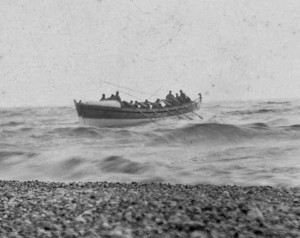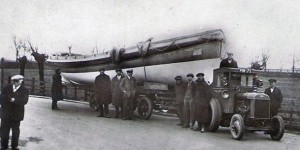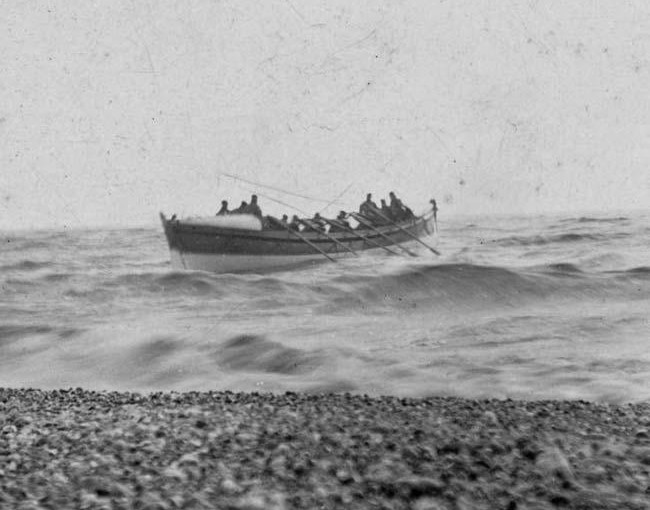15 November 1928
By Sue Igglesden
The sound of the maroons woke Alfie with a jolt. He knew instantly what it meant, but he also knew that at thirteen he was still too young to man the lifeboat. A fierce storm had blown up overnight and he lay for a while listening as bursts of rain lashed against his window.
Suddenly he felt the pulse of excitement that always comes with a call to the lifeboat, and he tumbled out of bed. He pulled his jumper over his head, twitched back the edge of the curtain and tried to peer out onto the street below. The rain poured in rivulets down the window pane, distorting his vision, but under the street light he could just make out the figures of three of the neighbours running along the road, their boots clanging on the cobble stones. The muffled sound of next door’s front door closing made him look down, and he glimpsed the top of his uncle’s cap pass underneath his window. He banged hard on the glass with the flat of his hand, but his uncle was already hurrying down the narrow street after his friends.
Alfie plunged down the stairs and pulled open the front door. He leaned out, shouting, “Good luck, Uncle Walter – bring them in safe!” but was disappointed to see his uncle turn the corner without looking back, and knew the wind and rain had snatched away his words.
“Come on, son, in you come.” His father had appeared and reaching around behind him, pushed the door closed. “Let’s keep that weather outside, shall we?”
“Is it time to get up, Dad?” Alfie spoke through a yawn, flapping his arms to keep warm. It was the middle of November, and the mornings dark and cold. Together they walked the few paces into the tiny kitchen tagged onto the back of the house, where his father reached for the kettle and teapot.
“It’s just gone five o’clock. Let’s hope it’s a quick one and Walter’s back soon. Though, with this storm I don’t know how much fishing we’ll be doing today, anyway.” He struck a match and held it to the gas ring. It popped into life and he settled the kettle on top. They stood mirroring each other, holding out their hands as close as possible to the warmth of the flame. He eyed his son thoughtfully. “You know, Alfie, now we’re up, I think after we’ve had our tea, we’ll put on our oilskins and go down to the boat house. We might be able to help any poor souls they rescue.”
There was just an inkling of light at the edge of the grey sky when Alfie and his father left the house. The storm was still ferocious and they struggled to keep themselves upright as they battled the mile and a half to the lifeboat house. Finally, wet and cold, they turned from the track onto the beach. Alfie cupped his hands over his eyes as the wind swirled sand into his face, and was surprised to see the lifeboat still tossing about in the shallow water. He could make out the crew inside the boat, indistinguishable from each other in their oilskins and sou’westers, backs bent double as they pulled on the oars. Volunteers from the village, the launchers, were up to their waists in the churning, freezing water, pushing with all their might to try to get the lifeboat on its way.
“Alf – here, come and help. Quick we’re losing it.” One of the launchers had noticed them arrive.
Alfie started forward, only to be barred by his father’s hefty arm. “No, son. He said ‘Alf’, not Alfie. That means me, not you.” Alfie stood, his arms rigid and his fists clenched as he watched his father enter the waves and together with the other men heave against the hull of the boat.
“This is the second time we’ve tried…” It was the same man shouting and Alfie could only just make out what he was saying over the sound of the wind and the waves crashing against the shingle beach. Then, as the boat turned and swept into the shore again, Alfie jumped and scuttled backwards, stumbling, almost losing his footing. As he looked along the line of the launchers, he saw their heads and shoulders dropping in sheer frustration and exhaustion.

“Once more, lads. Once more. She’s got to go!”
This time Alfie did run forward into the sea. Ignoring his father’s shouts and gasping at the iciness of the water, he found a space between two of the launchers. Reaching out to the boat he pushed against it as hard as he could. His hands slipped on the wooden hull, his soft skin splitting open, but something drove him on and despite falling several times he got up and leaned in again and again. At last the prow of the boat reared up and dropped down over the waves into deep water. As the men in the boat rowed and the sails began to lift Alfie stood, shivering violently, and watched as the Mary Stanford, the lifeboat of Rye Harbour, was finally launched.
Back on shore the men headed for the boathouse, slapping each other on the backs and exclaiming how Alfie had saved the day. He, though, was looking warily at his father who for a second seemed stern and angry. Then he too grinned and clapped Alfie on his back, but worn out from his efforts he promptly fell down onto the beach, adding more grazes to his already sore hands.
“Be plenty more of that to come, son.” Alfie’s father helped him up and gently brushed off some of the shingle that had stuck to his wet oilskins. Together they walked through the door and into the comparative warmth of the lifeboat house.
“Call them back! Send up the flares!” There seemed to be pandemonium inside.
“What’s happened, Dad?” He looked up anxiously at his father.
“The ship’s crew are safe, son. That’s what’s happened. They’ve already been rescued. All that and we’ve sent them out for nothing.” He shook his head in disbelief, then gripped Alfie’s shoulders. “They’re sending up the recall flares now. Feel up to helping her back in?”
Once again the launchers were assembled on the beach. Alfie stood in the middle as three times the recall signal was sent up, but three times the white flare was fragmented and dispersed by the wind and squalling rain. There was no response. No turning back. The Mary Stanford continued out to sea while the men stood on the shore, faces stinging with the salt spray, helplessly calling out to their friends and brothers.
Alfie and his father trudged back home, aching with exertion and disappointment. Later, with his father’s assurances that the lifeboat would turn and come back eventually, Alfie went back to bed. He was asleep in seconds.
“She should be back by now”
For the second time that day Alfie was woken suddenly, this time by a sharp rap on the front door. He sat up, groggy from a deep sleep, and listened to the voices downstairs. Creeping from the bed he stood at the door, straining to hear the words.
“Alf, she should be back by now. It’s almost eleven and…” the visitor seemed unable to finish his sentence. Alfie recognised the voice as old Mr Southerden, the very first coxswain of the Mary Stanford, and whose his son, Charlie, was in the boat with Uncle Walter.
“I’m sure she’ll be alright.” It was his father’s calming voice speaking now. “She’s probably heading for the harbour instead of the boat house. It’s been quite a storm, Bill.”
Desperate to believe his father, Alfie stood at the top of the stairs, but somewhere something was wrong. It was at that moment that he heard the most awful commotion in the street. First one voice, then more, shouts, doors banging, people running. Amidst the cacophony Alfie heard three anguished words that would remain with him for ever. “She’s gone over!”
The next few seconds were a blur, but then he was in the front room, gripping the door frame as he looked out at his neighbours, people he had known all his life, the faces of each and every one of wearing terror and panic. His father barged back through the door, knocking Alfie aside. He looked round at him, as if just registering his existence.
“Get your oilskins, son. They say she’s capsized off Jury’s Gap.” His words were few, but enough to galvanise Alfie into action, and within minutes he and his father were on their way, alongside every able bodied person in the small village.
As they approached the beach Alfie was still unable to believe the rumours. It must be alright. The men are strong. They would be able to right the lifeboat. But his thoughts, his hopes, were cut short by the booming of the maroons. Three times the great sound cannoned through him, and he knew.
The sight at the beach was one of chaos.
The sight at the beach was one of chaos. The lifeboat was floating, bottom up, further up the shore, and several dark shapes heaved like huge fish in the swell of the shallow water. Men were shouting at each other, and pulling the bodies, as Alfie knew they must be, up onto the beach. Men and women alike were falling beside each one, looking firstly for signs of life, and then with trembling fingers searching to see which of the seventeen lifeboat men was lying in front of them.
Initially Alfie stood and tried to count the bodies he could see. He wanted to know if his Uncle Walter was there among them, but somehow had a need to postpone that moment for as long as possible. Turning towards the lifeboat, still in the water, he saw his father wading in, and along with what seemed dozens of men, he ran up the shoreline to help.
Finally the Mary Stanford was brought into shallow water, still upside down. In a voice he hardly recognised as his own, Alfie asked his father if Uncle Walter had been found. “No, son. Not yet,” was the terse reply and Alfie backed off. This grim man was a father he didn’t recognise.
It seemed there were hundreds on the beach that morning, and Alfie realised word must have reached Rye Town itself, for there were many he didn’t recognise. All around people were bent over the still bodies, working relentlessly, trying to push life back into them.
As Alfie stood, staring, he heard an unfamiliar sound. He turned, his mouth gaping as he saw a tank trundling its way along the beach. Yet another person he didn’t recognise called out that he’d heard it had been sent to help from Lydd Camp. Soldiers jumped from the turret and waded in to the still floating lifeboat, securing it with huge ropes. It seemed to take an age, but eventually the tank pulled the boat up onto the shingle. Gradually, she was turned upright again, and he could see that both her masts were splintered and broken.
“We’ve got two inside! We need help!” Even if he’d wanted to Alfie couldn’t have got any nearer. Every man who was unoccupied at that moment converged, as with great difficulty two more of the crew were untangled from inside, hauled out and laid on the beach.
“We need a doctor here! This one’s still warm!” Alfie had now managed to move closer, only to stop, every part of his body rigid, as he registered the look on the rescuer’s face. “No, Alfie. Don’t come any closer. Find your dad, and quick about it.”
They worked on Uncle Walter for almost three hours. Eventually the doctor stood, and with eyes stung raw with fatigue looked at Alfie and his father. He had no words. With just a hand laid upon the shoulder and a shake of a weary head he moved away.
By the end of that afternoon Alfie knew that fifteen of the lifeboat men had been washed ashore. All were dead. He had witnessed scenes of grief, small tableaus of praying men and women, seemingly indifferent to the rain still washing over them. He had watched as mothers, fathers and children had followed the horse-drawn carts that took the bodies, one by one, to rest before burial. And then he and his father wearily followed the cart that held the body of his own Uncle Walter.
Five days later they again walked side by side behind his uncle and fellow lifeboat men. To the sombre strains of ‘Abide with Me’, they followed the funeral cortege as it slowly wound its way through the familiar street of Rye Harbour and into the churchyard. Never in his life had Alfie had seen so many people gathered in one place. Every street was lined with silent men, women and children. It was as if the whole world had come to his small village to pay homage to these very brave men.
Finally, as the cold winter sun began to set, the families stood around the memorial grave in the middle of the churchyard. Each coffin had its flag removed and Alfie read, with a mixture of grief and pride heavy in his stomach, the same inscription: ‘Died Gallantly’. And then, as the coffins were laid within the grave, he at last felt a kind of comfort in knowing that these men, who had been friends since childhood and who had ultimately given their lives together, would now rest together.

The Crew of the Mary Stanford
Herbert Head (47) – Coxswain of the the boat
Joseph Stonham (43) – 2nd Coxswain
Henry Cutting (39) – Bowman
Leslie George Clark (24)
William Thomas Albert Clark (27)
Albert Ernest Cutting (26)
Roberts Redvers Cutting (28)
Arthur William Downey (25)
Morriss Downey (23)
James Alfred Head (19)
John Stanley Head (17)
Walter Igglesden (38)
Charles Frederick David Pope (28)
Robert Henry Pope (23)
Lewis Alexander Pope (21)
Albert Ernest Smith (44)
Charles Southerden (22)
Greater love hath no man than this, that a man lay down his life for his friends
Rye’s Own March 2011
All articles, photographs and drawings on this web site are World Copyright Protected. No reproduction for publication without prior arrangement. © World Copyright 2015 Cinque Ports Magazines Rye Ltd., Guinea Hall Lodge Sellindge TN25 6EG
